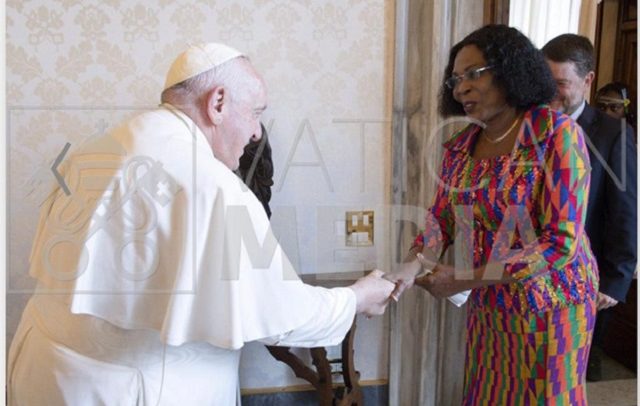Elizabeth Sackey with Pope Francis
Mayor of Accra, Elizabeth Sackey has called on the head of the Catholic Church, Pope Francis to deliberate on measures to mitigate the devastating consequences of climate change.
The Mayor who was in the company of a delegation from the Green & Blue Festival called on the Pope at the Vatican ahead of the World Environment Day celebration.
The Pope in a welcome address commended the Mayor and delegation for their commitment to protecting the environment stressing that combating climate change, required recognising one’s responsibility to those ‘who have contributed least to its occurrence’ and developing a sense of ‘responsible cooperation’ among everyone.
“Our world is now thoroughly interdependent and cannot allow itself to be divided into blocs of countries that promote their own interests in an isolated or unsustainable way… The real enemy is irresponsible behaviour that has profound consequences for every aspect of the lives of men and women of today and tomorrow,” he said.
Speaking after the meeting with the Pope, the Mayor of Accra called for more collaboration between the south and global north to tackle climate change urgently.
She disclosed that the city had carried out several activities to implement priority actions in the areas of waste, transport, and energy to address climate change and contribute to building a resilient and sustainable city.
She noted that Accra had mainstreamed climate actions in its development plan as well as carried out aggressive stakeholder engagements to ensure that no citizens were left behind adding that” inclusivity and equity are key.”
She stated that the City of Accra had begun planting trees to control greenhouse gases in the foreseeable future.
The Mayor and the delegation after the meeting together with Pope Francis, took a group photograph with a banner that read “Loss and Damage. Finance Now,” a reference to a fund that was agreed upon at the COP27 U.N. climate conference in 2022 after decades of pressure from vulnerable developing countries.
By Jamila Akweley Okertchiri

